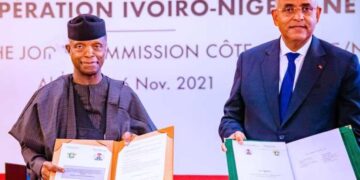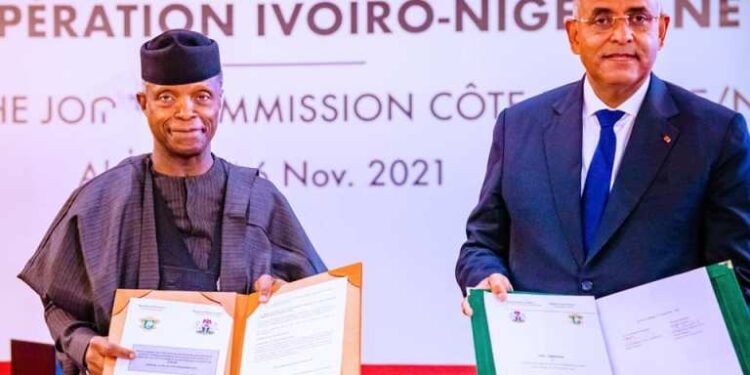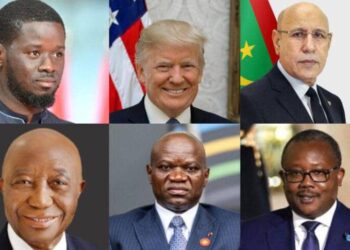By Emmanuel Nduka
Nigeria and Cote d’Ivoire have further strengthened ties with the signing of a set of new agreements on agriculture, digital economy, consular and immigration matters, education and prevention of human trafficking.
Nigeria’s Vice President Yemi Osinbajo signed on behalf of the Nigerian Government on Saturday in Abidjan, Cote D’Ivoire, at the 2nd Nigeria-Cote d’Ivoire Bi-National Commission Meeting.
Osinbajo co-chaired the meeting with the Ivorian Prime Minister, Patrick Jerome Achi, after which both leaders held talks.
Speaking shortly after the signing ceremony, Osinbajo said Nigeria and Cote d’Ivoire must continue to build closer economic ties and integrate, especially within the sphere of regional integration agreements like ECOWAS and the African Continental Free Trade Area (AfCFTA), so as to create more jobs for its youths and further deepen bilateral ties between both countries.
“We should put in place arrangements that enable value addition within and between our countries so that we can create the much needed jobs for our young people and stem the irregular migration to other parts of the world where they are often mistreated and used for menial tasks.
“They will certainly go a very long way to promoting the much desired and mutually beneficial cooperation between our two countries in accordance with the guidance given to us by both President Buhari and President Ouattara.
“These integration agreements must be seen as an opportunity that goes beyond trade, but one that helps to deepen regional value chains, instead of exporting raw commodities,” Osibanjo added.
While harping on the significance of the 2nd session of the Bi-National Commission, the VP noted that as two of the largest economies in ECOWAS, Nigeria and Cote d’Ivoire are expected to cooperate in the interests of its citizens and the rest of the sub-region
“Our shared values of democracy, protection of human rights and our aspirations for peace, progress and prosperity must continue to be the guiding principles for our cooperation for mutual benefit and for the well-being of West Africa.
“In agriculture, for instance, Cote d’Ivoire is a leading producer of key commodities like cocoa and coffee, which are crops that Nigeria also produces, and there is certainly great scope for learning and collaborating in the international trade of these commodities.
“In the same vein, given the large number of Nigerians who have made their home here, it is important that both countries cooperate closely on consular matters. We must also work closely together to tackle the evil practice of human trafficking which seems to be on the rise in this sub-region,” he added.
Speaking on a possible military cooperation between both countries, Osinbajo said, “Working together, we can help to maintain the peace and security of our countries and neighbourhood. With peace, businesses will thrive; so we are very much looking forward to the convening of the Business Forum leg of this Bi-National Commission.”
Earlier in his address, the Ivorian Prime Minister said he was excited that both countries had agreed to reactivate the Bi-National Commission, adding that the meeting was an ideal platform to improve the quality of trade cooperation between both countries and the ECOWAS region, as this would also address common interests and challenges in areas of security, oil and energy, terrorism, among others.
The cordial relations that exist between both countries regarded as the biggest economies in West Africa, was signed in 2013 as the Nigeria-Cote d’Ivoire Bi-National Commission.
The maiden edition of the Commission, which took place in Abuja in August 2013, led to the signing of six sectorial Agreements, as well as the establishment of Special Implementation Committees in both countries to monitor progress.



































